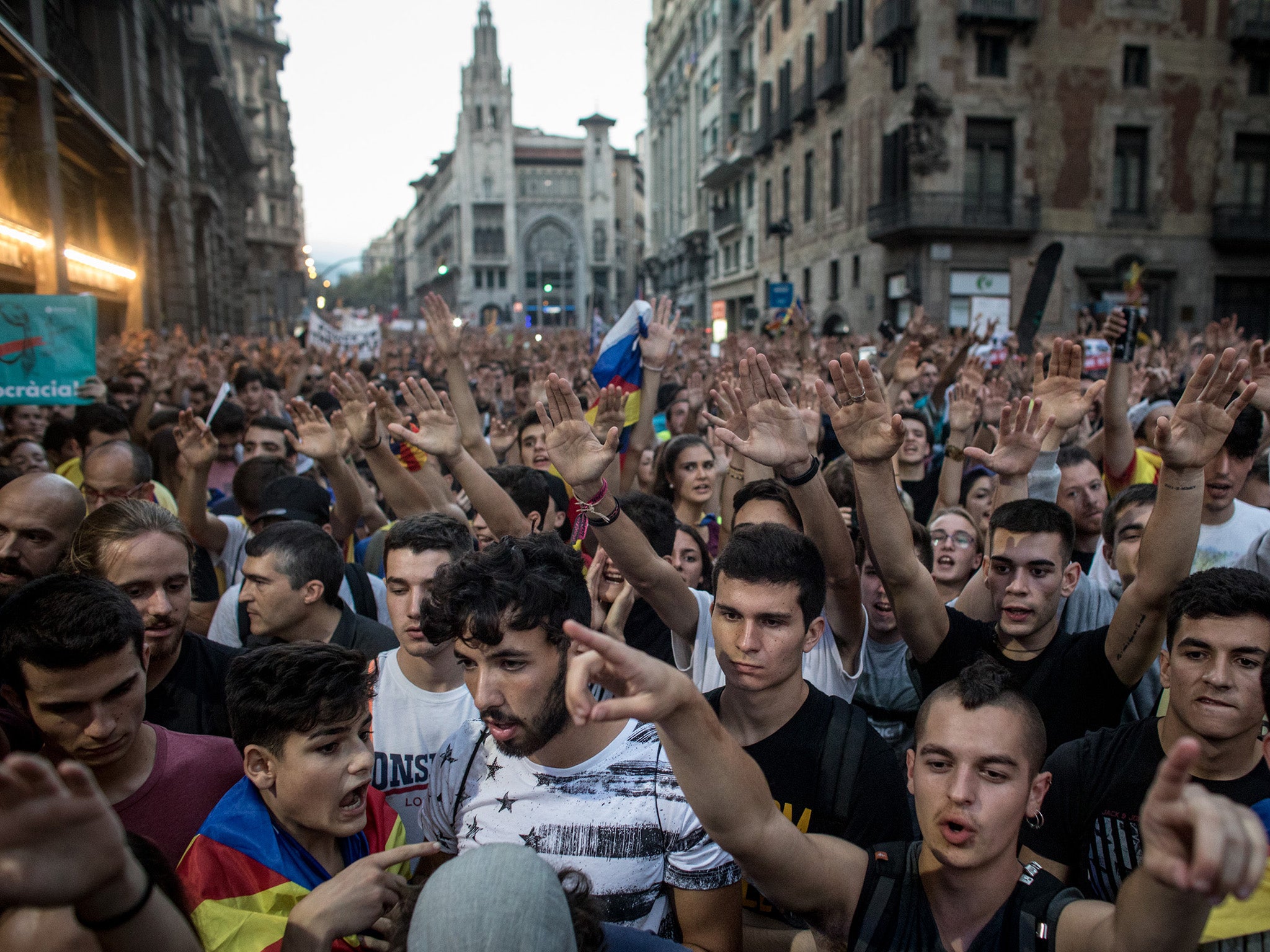Catalan referendum: Thousands strike and take to the streets to protest against police violence
Protesters chanted 'Independence', sang songs and carried signs

Your support helps us to tell the story
From reproductive rights to climate change to Big Tech, The Independent is on the ground when the story is developing. Whether it's investigating the financials of Elon Musk's pro-Trump PAC or producing our latest documentary, 'The A Word', which shines a light on the American women fighting for reproductive rights, we know how important it is to parse out the facts from the messaging.
At such a critical moment in US history, we need reporters on the ground. Your donation allows us to keep sending journalists to speak to both sides of the story.
The Independent is trusted by Americans across the entire political spectrum. And unlike many other quality news outlets, we choose not to lock Americans out of our reporting and analysis with paywalls. We believe quality journalism should be available to everyone, paid for by those who can afford it.
Your support makes all the difference.Thousands of people took to the streets and blocked roads across Catalonia amid strikes to protest against the police violence used during the weekend’s divisive independence referendum.
In Barcelona, schools, businesses and shops were also shut as part of a strike backed by the Catalan government, which will only serve to increase tension with Spain’s central government in Madrid.
The protests were largely peaceful, although some protesters forced shops and supermarkets that had decided to remain open to close. “Strike-breakers” was grafitied on the windows.
Journalists, including La Sexta’s Guiomar Roglan, also complained that they required a police escort to leave the Catalan Parliament building as they were attacked over their coverage of the week’s events.
Spain’s interior minister, however, accused the Catalan government of “inciting rebellion” by encouraging the protests as the country’s worst political crisis in decades continues to show no signs of resolution.
“Day after day, the Catalan government is pushing the population to the abyss and inciting rebellion in the streets,” Juan Ignacio Zoido said, adding that central government will take measures to “stop the acts of harassment”.
Having previously remained silent on the issue, the European Parliament has confirmed it will hold a special debate on Wednesday, while King Felipe VI of Spain announced he would give a special speech on the matter.
The protests in the Catalan capital of Barcelona continued late into the night, with Plaza Universitat, Pelayo, Las Ramblas, Plaza Catalunya, Fontanella and Via Laietana all closed off to traffic.
Protesters chanted “Independence”, sang songs and carried signs which read: "EU: You can’t can’t ignore this", "We want democracy", and "No more violence".
There were similar scenes in some of Catalonia’s other cities: Girona, Tarragona, Lleida.
While the majority of the people involved in the protests were draped in Senyeras and Esteladas – two variations of the Catalan flag, the latter representing a pro-independence feeling – there were also a number of people protesting who were indifferent to the independence debate.
Some even carried Spain flags or wore the Spanish national football team’s colours as they protested against the police violence used on Sunday in an attempt to shut down polling stations across the region after central government had deemed the referendum illegal.
Ruth Arbues Lamana, a Barcelona resident, told The Independent she had taken to the streets “as a protest for the violence on Sunday by Spanish police and not for independence.”
The Catalan government said 893 civilians were injured on Sunday and one of the largest protests took place outside Spain’s national police building in Barcelona, where there were chants for the Spanish police force to leave the region. Protesters had previously forced 150 police out of a hotel in Canella on Monday night.
Meanwhile, outside the central government office in Barcelona, thousands protested in silence with their hands held in the air.
More than 50 barricades or protests had blocked roads across Spain’s north-eastern region on Tuesday morning, including major toll roads and motorways which link the country to France, with Catalan president Carles Puigdemont calling for a “democratic, civic, dignified protest” on Twitter.
He added: “Don’t let yourself be provoked. The world has seen it: we are peaceful people.”
Protestors, tractors and tyres blocked the roads, while two people sat playing chess in the middle of one motorway.
FC Barcelona was among those to join the strike, with the club saying in a statement it “seeks to bring together all those people who on 1 October, whether they voted or not, were left indignant by the serious events which took place during the day of the Catalan referendum on independence”.
The metro in the city ran a limited service, with passengers allowed to travel for free, while there were also reduced services at the Port of Barcelona.
However, flights were running as normal from Barcelona-El Prat airport.
Mr Puigdemont has said 90 per cent of Sunday’s 2.3 million voters backed independence from Spain and while central government will attempt to stop any breakaway, he maintains that the referendum is “valid and binding”.
But he has stopped short of declaring independence yet, despite his government’s previous promise that secession could happen within 48 hours of a Yes vote.
Spanish Prime Minister Mariano Rajoy, though, refuses to give the referendum any credence at all.
“We cannot allow the progress of the past 40 years to be replaced by blackmail,” he said this week.
“We all have reasons to trust our democracy. This has only served to hurt our coexistence. I offer dialogue within the law. I expect them [Catalans] to renounce to what they have done so far.”
Join our commenting forum
Join thought-provoking conversations, follow other Independent readers and see their replies
Comments